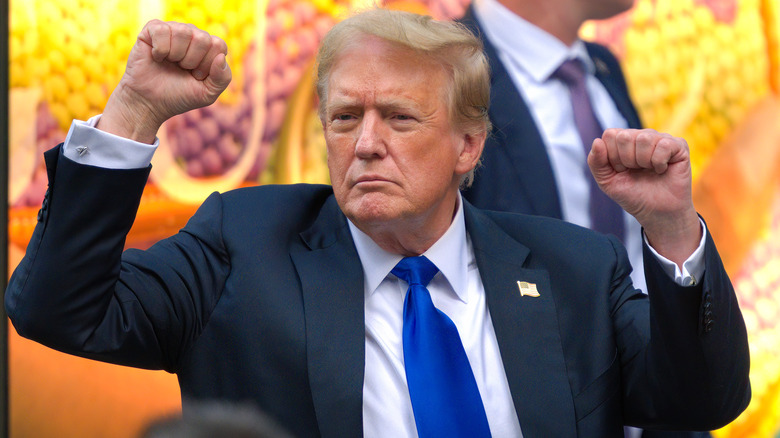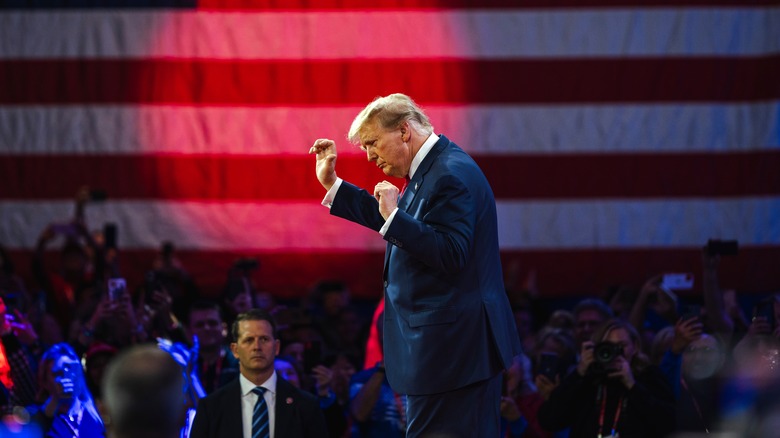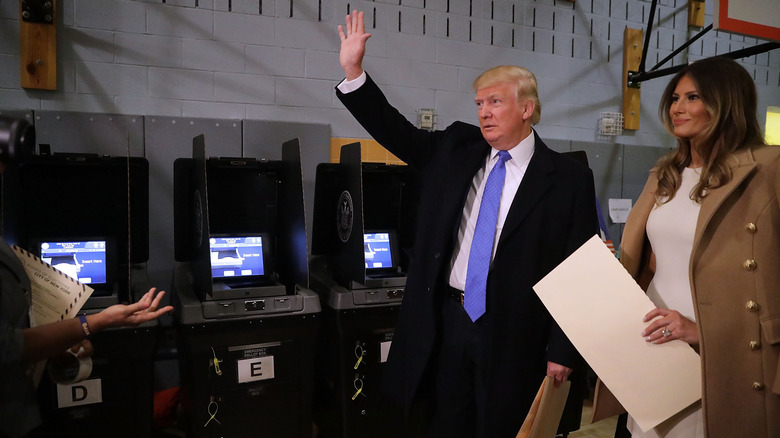Legal Expert Predicts For Us What's Next For Donald Trump Now That He's Found Guilty
Donald Trump's conviction on all 34 felony counts in his hush money trial set off a tsunami of speculation about what will happen to him next. His attorney, Todd Blanche, told CNN that the plan is to battle the verdict via pre-sentencing motions. If that effort doesn't prove fruitful, Blanche will appeal the case following Trump's sentencing on July 11. The big question now is how severe of a punishment Judge Juan Merchan will slap Trump with for falsifying business records to cover up hush-money payments made to Stormy Daniels. According to one legal expert, there's a high likelihood Trump won't be seeing the inside of a prison cell anytime soon.
Los Angeles trial attorney Tre Lovell provided Nicki Swift with some exclusive insight into what to expect on Trump's sentencing day. The maximum possible sentence for each of his Class E felony counts is four years, but there's no way he'll get handed a 136-year prison sentence. "Theoretically, the judge could sentence Trump to consecutive sentences, which would be capped at 20 years under New York law," explained Lovell. "However, in cases like this where Trump has no previous record and it's a non-violent crime, if there is prison time for multiple sentences, they would likely run concurrently for a maximum of four years for all." While Trump would still be able to lead the country from behind bars if he was given jail time and elected president, Lovell suggested that this isn't a likely scenario.
Donald Trump could get off with probation
According to Tre Lovell, being a first-time offender could help Donald Trump leave his sentencing hearing knowing that he'll remain a free man, albeit with the restrictions that come with being on probation. Former New York prosecutor Tim Bakken agreed, telling CBC that this is the prevalent view among those well-acquainted with NYC's criminal justice system. However, Judge Juan Merchan will also take into consideration Trump's behavior during his trial — it did earn him 10 gag order violations and a jail threat from the judge, after all.
As far as how being a convicted felon will affect Trump's chances of winning the presidency, Lovell believes that his steadfast supporters probably won't jump ship. However, he added, "Some independents, though, who are on the fence may be disheartened and step away from him." A January 2024 Bloomberg News/Morning Consult poll found that 53% of Americans living in swing states would not vote for Trump if he were to become a convicted criminal before the election. However, the polling was in Trump's favor as his trial concluded — according to FiveThirtyEight, he had an almost two-point aggregate lead over Joe Biden nationally. His trial also hasn't made him political poison in the eyes of many other prominent Republican politicians. Several of Trump's VP candidates even showed up at court to support him.
Donald Trump may not lose his right to vote
While it's true that many convicted felons can't vote, the verdict in Donald Trump's case did not automatically strip him of that right. Trump is a Florida resident, and the state upholds the laws of the states where its criminal residents are convicted. Because Trump was convicted in New York, this means that he will only be unable to cast a vote for himself on Election Day if he is in prison at the time, which is looking unlikely. According to CBS News, even if he's on probation, it will not be illegal for him to enter a polling booth.
But while many felons are allowed to participate in U.S. elections, former GOP Congressman Adam Kinzinger observed on X, formerly known as Twitter, "Trump is now ineligible for even a basic 'secret' security clearance." Trump wouldn't need it if he were to wind up back in the White House — he'd automatically regain access to all sorts of valuable classified material.
Some people are also finding it hard to wrap their heads around the idea that a convicted criminal can run for president (especially when that criminal's crimes are related to trying to influence a presidential election.) "My wife asked me today if a felon could serve as president," tweeted The Atlantic writer Tom Nichols. "I said no one prohibited it in the constitution because the founders could not imagine that we would even think of something so crazy."



